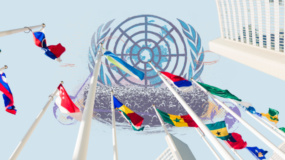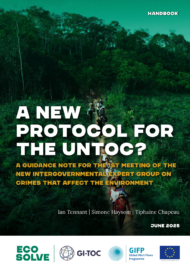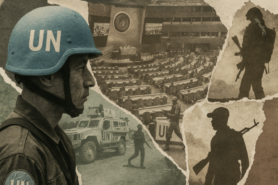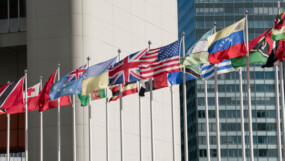Posted on 18 Jul 2025
Ordinarily, staff at the United Nations Office in Vienna would now be preparing for a well-earned summer: tying up loose ends, attending final meetings, setting out-of-office replies and beginning to unwind. This year, however, employees at the UN Office on Drugs and Crime (UNODC) will find it very difficult to switch off, as geopolitical tensions are having a direct impact on their work and prospects.
Delegates covering UNODC issues in Vienna have endured a particularly heavy agenda and dramatic turns of events this year. Until recently, staff at the permanent missions could more or less predict what would happen in the coming months. But predictability has now altogether disappeared, and old assumptions about multilateral diplomacy are on life support, including the idea that reaching consensus on issues was the norm, a concept known as the ‘Vienna spirit’.
The UNODC is facing crises from all angles. Its project-dependent funding base is under existential threat; UN reforms are threatening the small portion of the budget it regularly receives; and the implementation of its programmes is coming under increased scrutiny, whether concerning drug conventions, the Convention on Transnational Organized Crime (UNTOC), the wide range of standards and norms under its guardianship or the programming formula it has developed over the last almost 30 years.
Meanwhile, its executive director, Ghada Waly, unexpectedly resigned in May, potentially leaving the organization without leadership at the most vulnerable moment in its history. Furthermore, the US, historically the organization’s biggest and most active donor and member state, is now making far-reaching decisions that will significantly reduce the body’s funding and programming. The need for member states and the secretariat to drive innovation and reform has therefore become an urgent priority.
A successful but vulnerable corporate story
By many measures, the UNODC’s relatively short history and funding trajectory is a success story. Established in 1997 through the merger of the UN’s drugs and crime programmes, it has steadily expanded its mandates to include servicing the international drug, crime and corruption conventions; the crime commission; the Crime Congress; the terrorism prevention regime; and countless standards and norms on crime prevention and criminal justice.
All of these conventions and policymaking processes require secretariat services, which receive funding from the UN’s regular budget. But the majority of the UNODC’s funding comes from voluntary contributions, primarily from the US, the EU, Canada, Japan, the UK and Germany, as well as Middle Eastern countries.
This ensures that the implementation of the UNODC’s mandates in the field is donor-driven and not equitably distributed based on need; rather, it depends purely on the preferences of donor and recipient countries. However, this makes the body particularly vulnerable if a donor decides to stop funding projects, as the US is currently doing.
Due to the funding cuts, projects have already closed or will do so shortly. Staff are seeing their contracts end, as are their colleagues in other UN agencies. Ongoing discussions around UN reforms also indicate that the regular budget the UNODC receives will be threatened.
Although the EU’s contributions are now significant and the size of grants from Gulf countries is increasing, there is no other donor with the capacity to make up for the loss of US support. It is almost impossible to imagine where replacement funding could come from, and it is increasingly clear that substituting one donor for another is neither the right nor the feasible approach.
Other Western governments are already reducing their foreign assistance budgets as they respond to their own changing priorities. And emerging leadership from the Middle East, China, Brazil and other countries will not produce the equivalent levels of project funding any time soon. For now, funding will simply decrease, along with projects and the staff implementing them. The UNODC will have to accept that growth has come to an end and that innovative reform is the only option.
Who can fill the gap?
The challenge is not just financial. As with the UN more broadly, the US has provided policy and resource leadership across many aspects of UNODC policymaking since its inception, with its delegates chairing committees and working groups, anchoring Western positions in negotiations, and providing stability through dedicated bureaus and staff familiar with the workings of the organization. Western and other partner countries relied on their knowledge and institutional memory, as did the secretariat. The US delegations sent to this year’s commissions were much smaller, and came with a very different set of policy priorities and a mandate to critically review the body’s programming and impact.
This is another dramatic shift that could prove irreversible. Unlike with the funding gap, however, there is an opportunity for member states to come together and provide leadership where the US has previously acted alone. But this should not be with the aim of simply replacing US funding and commitments; rather, it should be to reform the UNODC to increase its impact in a new political landscape. This drive should come from member states and, crucially, from the UNODC’s and UN’s leadership.
During Waly’s and her predecessor Yury Fedotov’s mandates, the UNODC’s leadership was characterized by a degree of caution and conservatism. This approach did not always position the organization well when it came to promoting innovation and strategic responses to the challenges it was set up to address. While this cautious strategy may have been appropriate in the past, it will not serve the UNODC well in the future, given the new environment.
As the UNTOC approaches its 25th anniversary, organized crime is at record levels, with many countries struggling to contain it and fierce political debates taking place in many democracies about how to respond. Despite widespread ratification and legislation, and all the capacity-building programmes that have been implemented, there has been no meaningful evidence presented by the UNODC on whether the UNTOC and its three protocols have had any tangible impact on criminal markets.
Where next?
The UNODC will face a critical period for the multilateral response to organized crime next year. The new convention against cybercrime is set to open for signature later this year, with the UNODC acting as its secretariat. The anniversary of the adoption of the UNTOC will be recognized in November 2025, and the next Crime Congress will take place in April 2026. Member states are also considering the need for a new UNTOC protocol to address environmental crimes, and a new high-level review panel will consider the efficacy and impact of the international drug control regime.
The new executive director will face unprecedented challenges at a critical juncture for the organization. The UN Secretary-General would be wise to appoint a new leader (even on an interim basis) who has the ambition, fresh ideas, political gravitas and skills needed to meet this challenge. Now is not the time to continue with the formula that has characterized the most recent leadership. A recognition of the scale of the crisis and a renewed vision for the future is urgently required from both member states and the UN, and Waly could make it her legacy to lay the best possible groundwork for reform for her successor.



